This dispatch is the entirety of S02 Episode 2. Illustration by Jason Li.
Tianyu: China’s relationship with video games is complex. On the regulatory side, there are strict restrictions on what games are released domestically and who gets to publish them; authorities have also enforced real-name policies in online games and prevented minors from gaming on weekdays. Yet it’s also home to the world’s largest gaming market and major game publishers. Beneath the headlines, gaming and indie game development is...thriving.
Krish: Like elsewhere, video games are frequent targets of societal moral panics here, but these come with teeth. Recent waves of regulatory tut-tutting and “guidance” towards the games industry suggest a strong desire to reign in the wilder side of Chinese games culture—controlling not just what games are available, but what these games say.
Yuxin: As an indie developer myself, these new restrictions really hurt. To call out a few: 1/ Requiring all in-game text and voice-overs to be localized: sure, that’s fine. 2/ No skeletons, no blood: goes too far but grudgingly work-aroundable, maybe. 3/ Foreign games must work with a Chinese publishing partner: that just means an even smaller slice of the cake, but 4/ recommending “no moral choices” and “no ambiguity about gender” would invalidate and force out so many indie games and developer visions.
Tianyu: Which brings us to Steam, the dominant PC games platform where you can still download (and not pirate) video games without the restrictions of Chinese censors, and within the Great Firewall. I’m not a gamer these days, but as a clueless 13-year-old in Beijing I spent hundreds of hours in Grand Theft Auto, which, for better or worse, would never have been permitted to enter China through proper channels.
Steam operates in a rare in-between space, both in terms of legality and community, offering a relative enclave of freedom for gamers and indie developers from China.
It’s also one of the few social platforms where Chinese players would run into unmediated political confrontations with Hong Kongers or Taiwanese (the discourse is less civil than Clubhouse). It’s no surprise, then, that Chinese gamers have always wondered why the platform has yet to be fully blocked by the Great Firewall, praying that the day never comes.
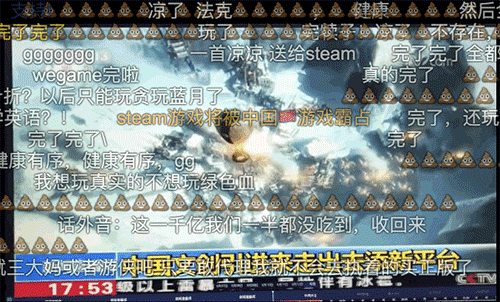
Krish: In the first season of Chaoyang Trap, we’ve covered corners of China’s creator economy, from podcasters to WeChat stickers, to wanghong-driven urbanization. In this episode, Aaron Fox-Lerner looks into the multilayered dynamics, between creators and users, regulators and gamers, and the “local” and “foreign” on Steam.
Seen another way, here’s 5000 words on games writer Sisi Jiang’s tweet last month:
“Huge if true: maybe Chinese gamers are just like you.”

Aaron: Chen Guanpeng was studying for a degree in Japan when he played the game that would change his life. In Lucas Pope’s Papers, Please, you play a border guard checking documents in a fictional Eastern European communist state. It’s not a game many would describe as fun, but fun’s not the point: instead the purpose is to force you as a player into a system of complicity, making tough moral decisions as the system you work for crumbles around you.
When Papers, Please came out in 2013, it became a standard bearer for the concept of “indie games” as akin to indie music or arthouse film, so much so that it’s become a cliche to cite it as an example of games as art. As a small project that placed meaning above immediate gratification, it was a key example of how games from small studios or solo developers could experiment and focus on artistic expression in ways that were impossible for more mainstream or “AAA” games. Buoyed by digital marketplaces like Steam that enabled direct downloads instead of pricey physical copies, it was one of a new generation of indie games that began to explode in visibility and popularity.
“I played [Papers, Please] and I found out that the game was made just by one person. I’d never known that such a thing was possible,” Chen told me one evening this summer, after he’d finished work at his day job for a Japanese media company making mobile games. Originally from Guangdong, Chen used his newly gained access to YouTube outside China to watch tutorials on game-making, and inspired by Papers, Please, set out to make his own game.

When his game Booth came out last summer, it was one in a wave of Chinese games, both indie and otherwise, available on Steam, now the preeminent digital games marketplace. When Papers, Please was released eight years ago, it still had to go through a gatekeeping process on Steam called Greenlight. Since then, it’s opened up its process for developer submissions, and tens of thousands of games are listed, with hundreds added weekly.
It also has a lot of Chinese players. It’s hard to pin down exact numbers, but different surveys have estimated the number of Chinese players as ranging from 30 to 37.8 percent of Steam’s 120 million users, which means Chinese might have overtaken English to become the most popular language on the platform. So far, so obvious: there’s a lot of people in China, a lot of them play games, it’s a giant market worth a lot of money, yadda yadda yadda.
Steam’s large enough to matter, but what’s notable about it isn’t its size. Far, far more people play games on their phones in China than on computers or consoles, and even the Tencent-owned computer games platform WeGame has more Chinese users than Steam. Chinese indie games are also regularly published on domestic platforms like WeGame or TapTap.
Instead, what makes Steam crucial for Chinese players is that the majority of its games are as easily accessible in China as they are outside of it. For now, the platform exists in a gray zone: not blocked in China, but not officially allowed either. Anyone can hop on Steam without a VPN, choose from thousands of uncensored games, and pay for them using UnionPay, WeChat, or Alipay.
Henry: In fact, you can also VPN into the Great Firewall and buy Steam games at a fraction of the price they’d go for in the West—something I, now a Chaoyang exile, will probably avail myself of.
Krish: Steam has been in the crosshairs since roughly 2017, when it started adding fairly powerful community features—user-organized groups, social forums—and centering community content. Sure enough, Chinese developers were early adopters in creating political games on a briefly-free platform. All community pages were swiftly blocked in China right after but, to widespread surprise, the rest of Steam remains operational to this day.
Aaron: Steam’s liminal status has benefited Chinese developers too, allowing them to bypass absurdly strict censorship and the laborious, expensive process of getting officially approved for release in China, while still reaching players both at home and abroad. The platform’s now full of all kinds of games from China: passion projects sweated over by hobbyists, schlocky meme games pumped out by obscure developers, polished projects backed by Chinese tech behemoths, anime-style visual novels made by Chinese otaku, and an (un)surprising amount of porn.
This has turned Steam into a major part of the Chinese gaming world, a conduit allowing foreign games to find audiences in China and Chinese games to reach audiences globally. An entire Steam-focused ecosystem has sprouted across Chinese social media in response to the platform’s new prominence: Official Accounts (公众号) reposting Western game news on WeChat, users spouting off about over- or underrated games on Zhihu, hours-long game critiques on Bilibili, guides to female friendly games on Xiaohongshu.

Aaron: The rise of Steam in China has also coincided with a wave of commercial and critical success for Chinese games overseas—and for many of those games, the platform’s been a critical part of their success. In fall last year, the free-to-play anime style RPG Genshin Impact, from mid-sized Shanghai studio Mihoyo, was released simultaneously on mobile and PC (although notably not on Steam) and quickly became one of the most popular games in the world. In January this year, Dyson Sphere Program, a sci-fi strategy sim from a six-person studio in Chongqing, was released on Steam and went on to sell over a million and a half copies. Most recently, Shanghai-based indie studio Pixpil’s gorgeous pixel-art RPG Eastward rocketed up both the Steam and Switch sales charts upon its release last month. And these are only the most prominent of the Chinese hits to have garnered global attention. Others like My Time at Portia and Bright Memory have also earned strong sales, while upcoming games like Black Myth: Wukong and ANNO: Mutationem have successfully generated a lot of hype among both Chinese and global players.
Krish: Special shout-outs to the incredible upcoming 躺平 simulator Exhausted Man by Beijing indie studio Candleman. It’s already my game of the year:

Yuxin: Great for these devs! It’s interesting that although funding and revenues for indie games in the US now increasingly involve platform deals with storefronts like the Epic Store, Apple Arcade, Oculus Store, Playdate, or Humble Bundle, Chinese indie devs are, so far, still largely committed solely to Steam.
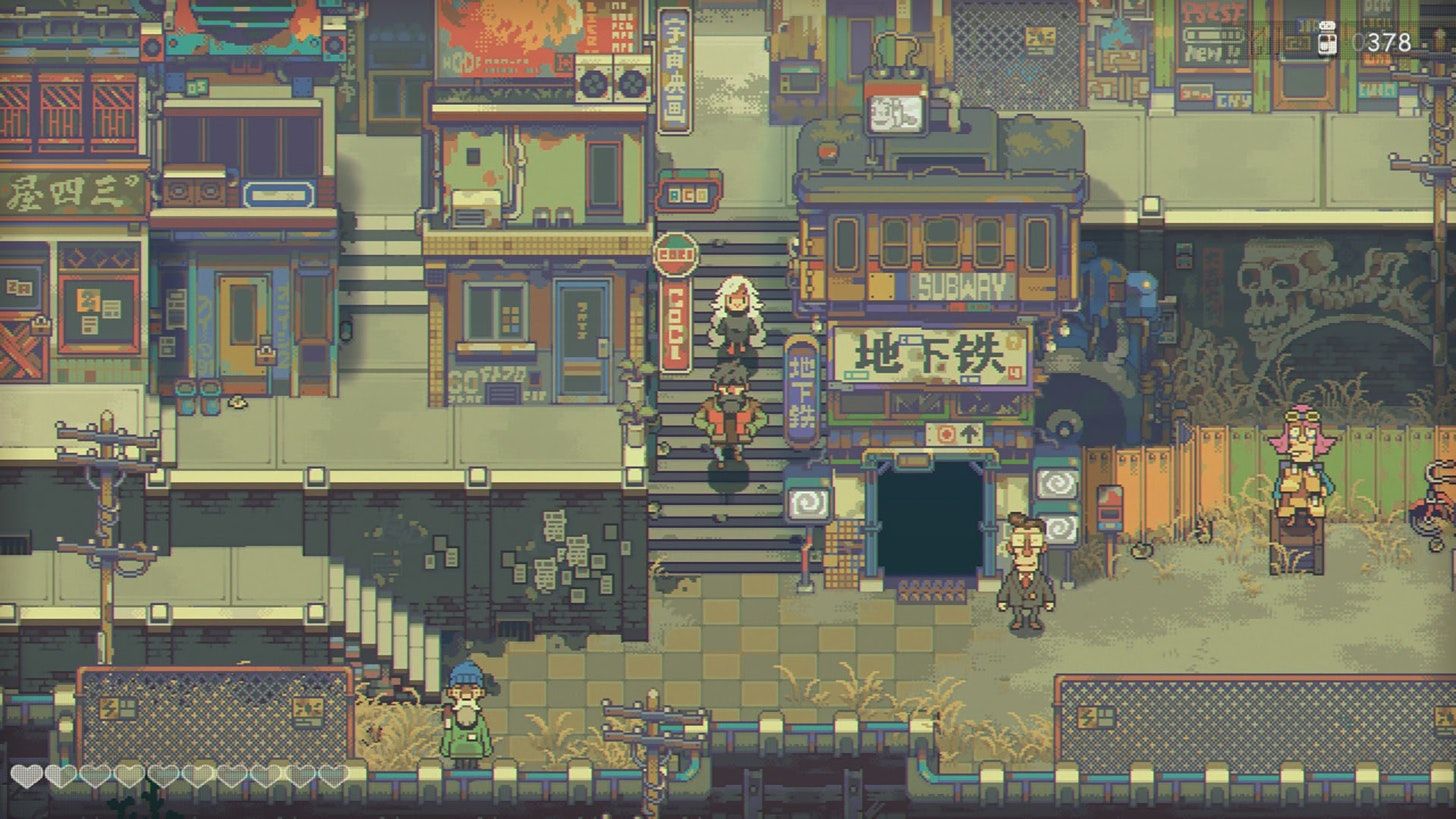

Aaron: Unlike seemingly any other kind of art or culture from China, Chinese video games have been given the space to be video games first and Chinese second. While it feels like every Chinese movie or novel is forced into a dichotomy of being either a brave dissident statement or symbol of China’s unstoppable rise, both players and games media have mostly reacted to Chinese games on their own terms. Part of this may simply be that there’s nothing distinctively Chinese about the planet-devouring automation of Dyson Sphere Program or the cute, colorful apocalyptic fantasy world of Eastward. Still, it’s not as if any of these recent hits are hiding their country of origin, and other relatively successful games like The Rewinder boast ancient Chinese settings.
Christina: I spent a bit of time talking to Chinese indie devs in 2015 or so, and one thing that really struck me was how the Chinese game industry—even the indies!—saw itself then as much more closely aligned to the tech industry than to other forms of media. In the U.S., game developers tend to look to Hollywood studios and filmmakers as their closest peers, and games are clearly positioned as a media product like films, whether blockbuster or indie. In China, probably due to the explosive prominence of the mobile games industry or to the inescapable presence of Tencent (which is arguably as much a games company as it is a tech company), game studios felt and acted much more like startups—corporate slides, rags-to-riches overnight stories, way too much investment funding and all. I suspect the thematic freedom games enjoy is related: tech companies aren’t media, and just get to convert users and make money however they see fit.
Krish: Could there be anything more Chinese than this bit of lore from Tale of Immortal, though?
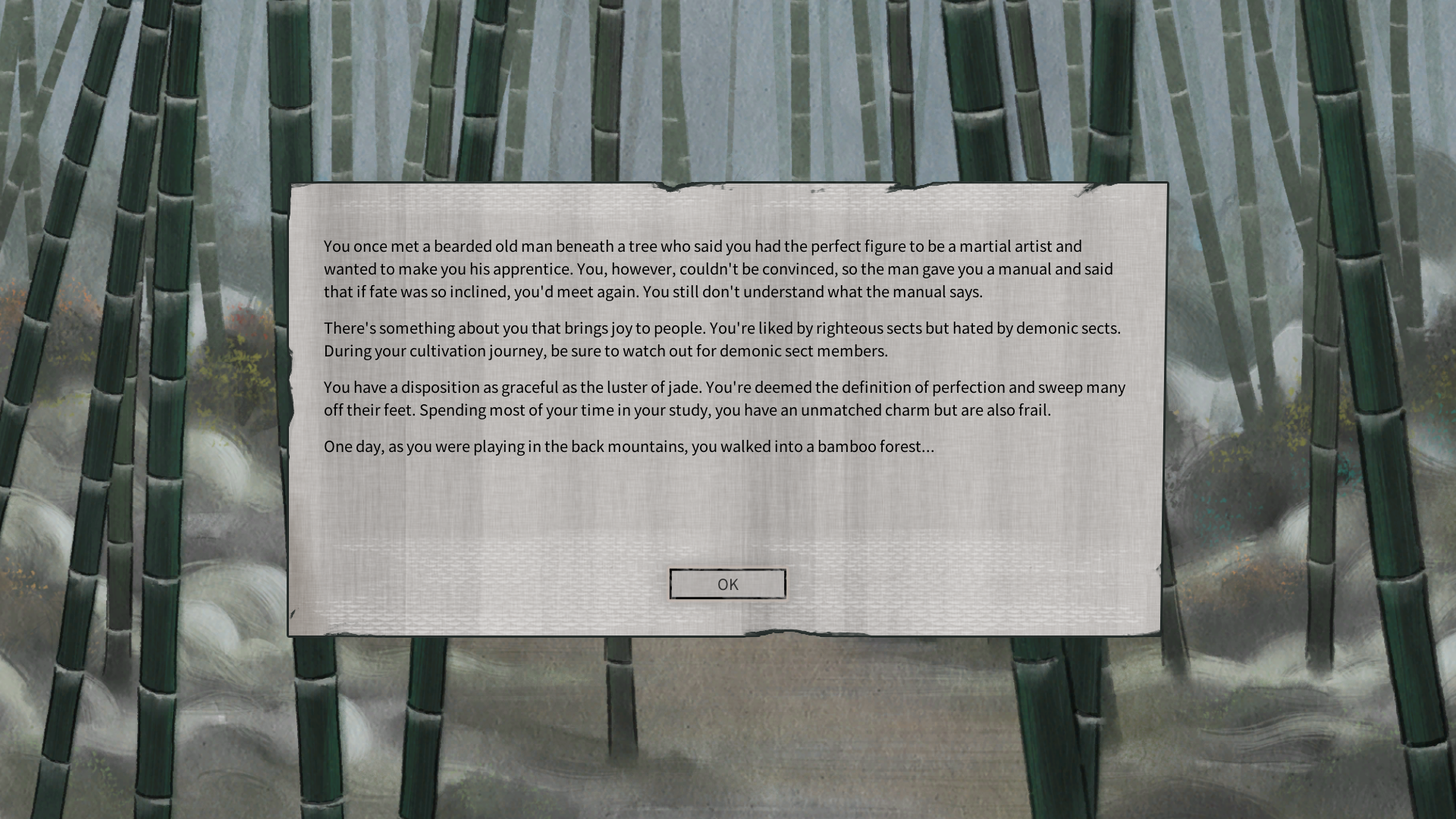
Aaron: These “international” hits have been matched by a series of games made for Chinese audiences that have mainly gained international attention due to their visibility on the Steam sales charts. Games like Scroll of Taiwu, Chinese Parents, Sands of Salzaar, GuJian 3, Amazing Cultivation Simulator, and Tale of Immortal are hugely popular on the platform with Chinese players while largely baffling or simply going ignored by international games media. Many are RPGs or management sims based in xianxia, the uniquely Chinese fantasy genre, and centered around the idea of “cultivation” (修仙, xiu xian. Put very simply, raising yourself from a mortal into an immortal).
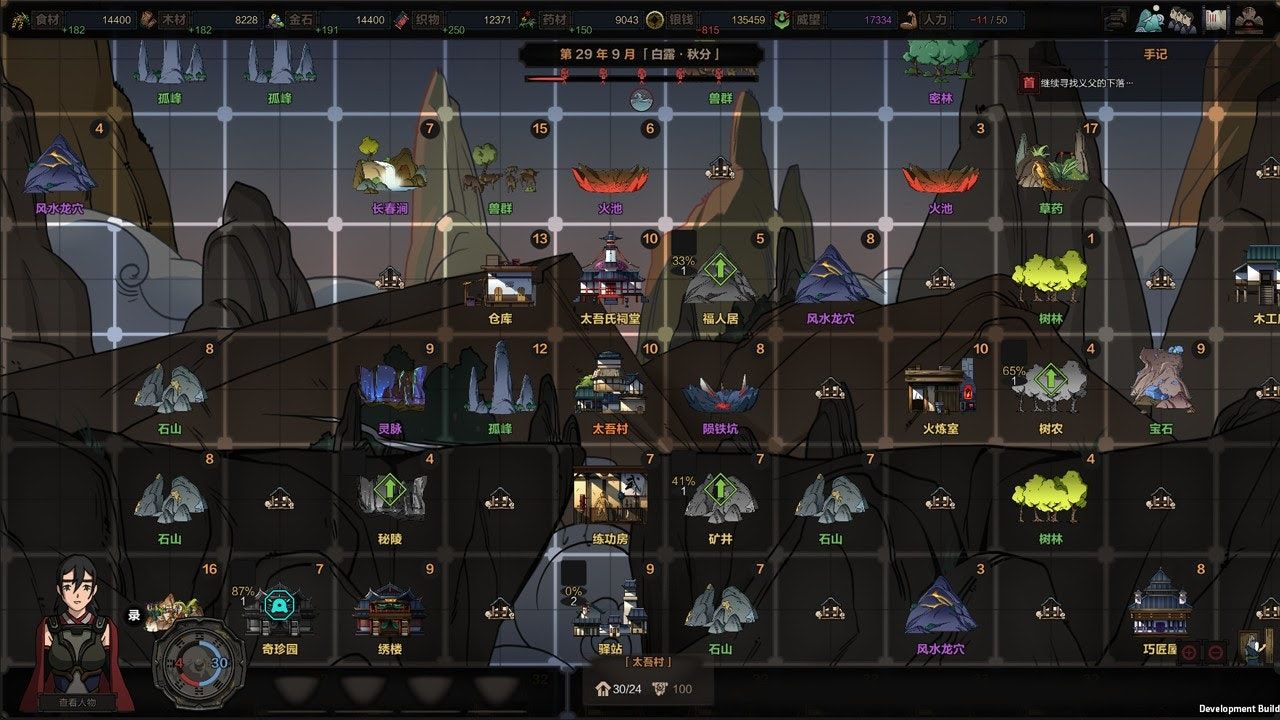
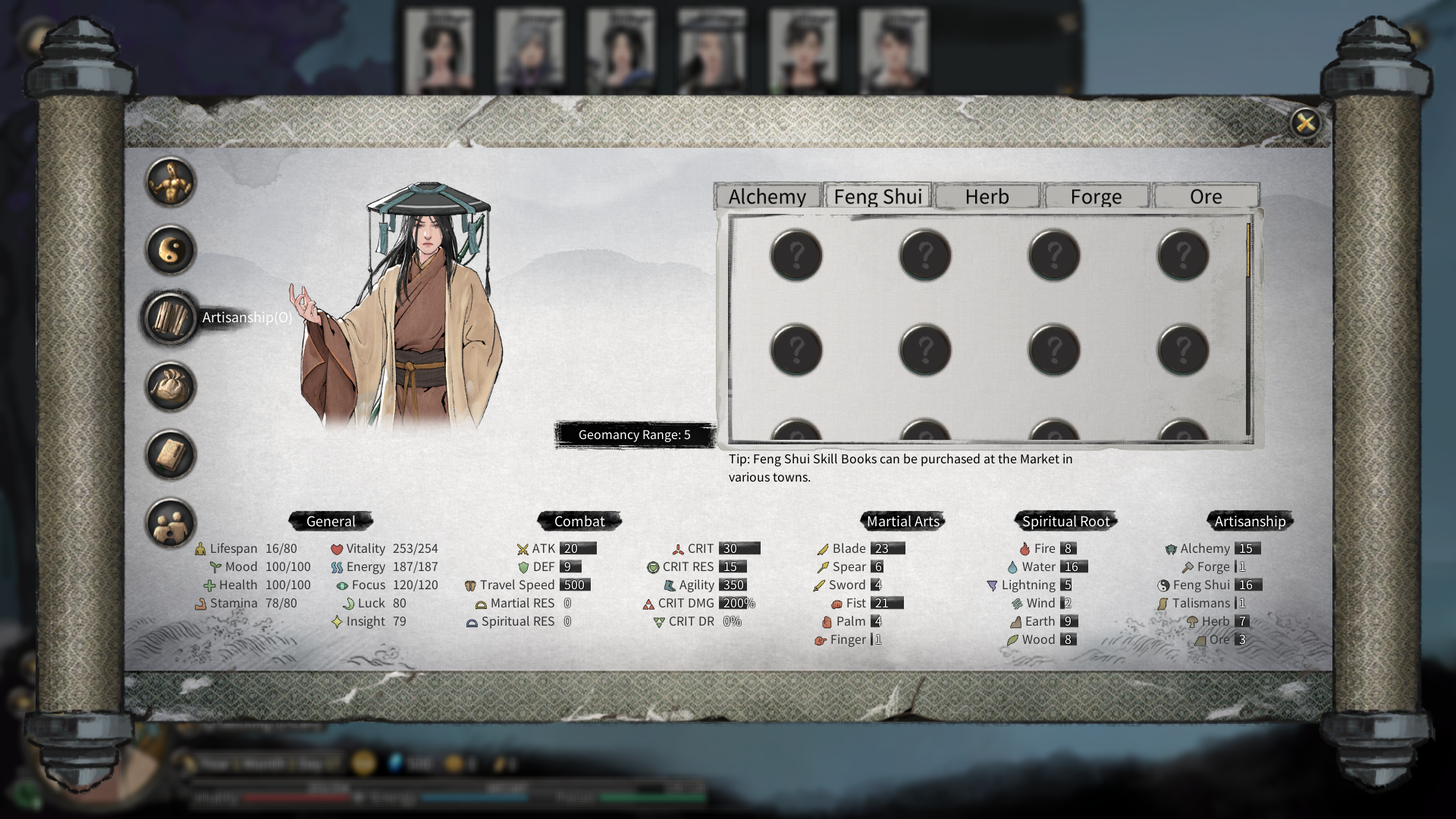
Krish: Put not so simply, “cultivation” is sort-of the culmination of a very particular videogame pleasure called “Number Go Up.” You introduce many numbers, within interlocking systems, that can go up, and modifiers to those numbers that can make them go up faster (spoiler: some numbers may go down). Cultivation games require mastery of steep learning curves, with the promise of an immensely satisfying gameplay experience for the patient.
Aaron: “Cultivation and some of the wuxia themes seem way too niche for the Western market, and not just niche, but really, really complicated,” Zhu Jingtong, a producer at a major Chinese games publisher and tireless booster of Chinese indies on Twitter, told me. “Even as a Chinese person, I don't fully understand what it means. I was always explaining what cultivation is to non-Chinese people, but I always failed, which means that the cultural barrier is way too high for this particular genre to be popular outside of China.”
As a story-heavy RPG with a decent English translation, GuJian 3 has proven slightly easier for the media to cover than hyper-complex sims like Amazing Cultivation Simulator, garnering comparisons to The Witcher and Final Fantasy. But as a fan of classic wuxia who’s often annoyed by the genre’s higher fantasy offshoot, the game’s overly complicated, melodramatic story embodied much of what irks me about xianxia.
Yuxin: xianxia is awesome 🥺.
Aaron: Right, it doesn’t really matter if I liked it: the game has its own intended audience, and I’m simply not part of it. “I do think that these games are made for Chinese people by Chinese people, so I don't think it's a problem or anything,” Zhu said. “Games that are not xianxia, wuxia, or games that are not too Chinese can find a bigger audience, especially more modern ones like Dyson Sphere Program.”
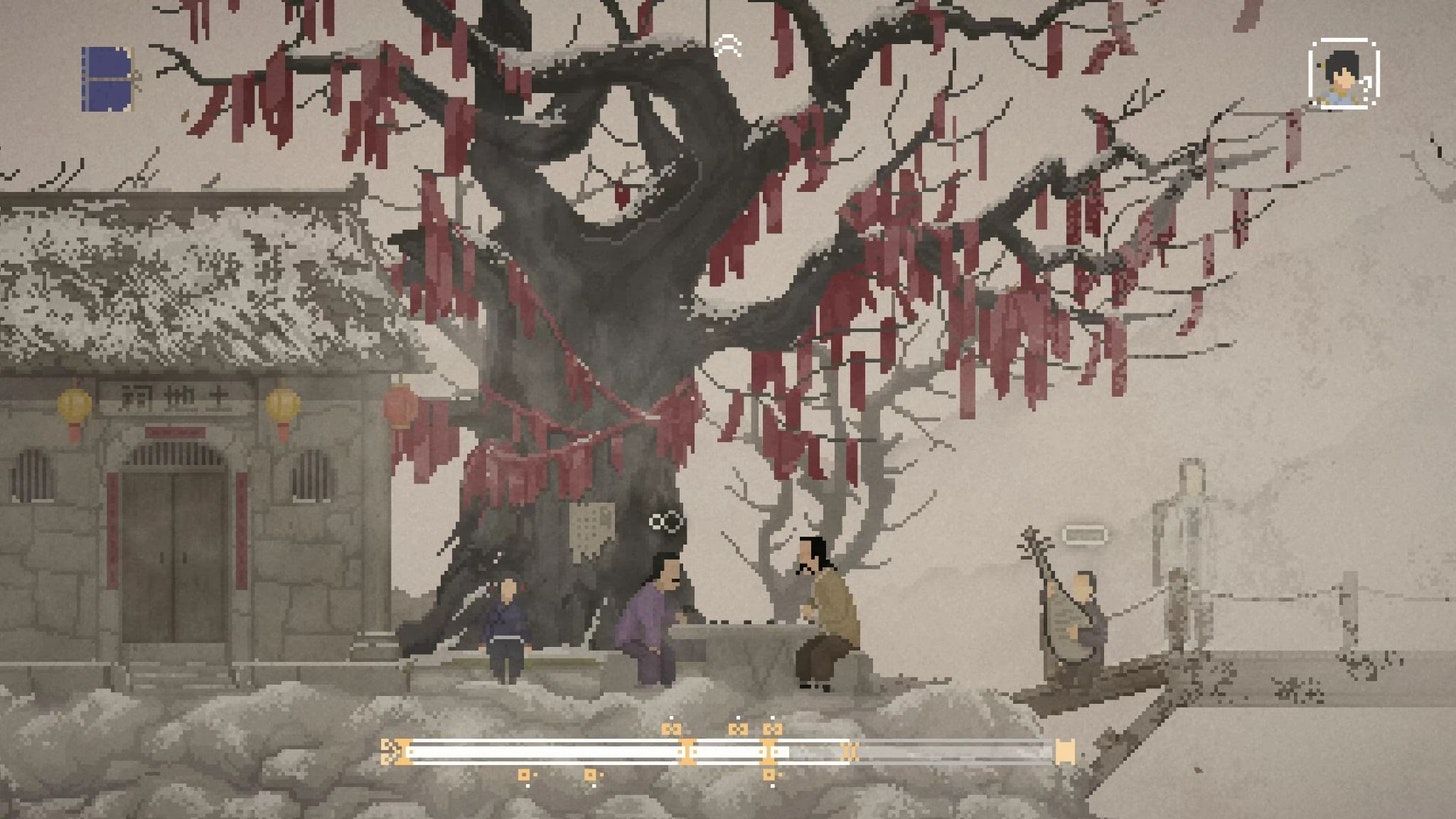
Krish: It’s interesting to think of Chinese indies as a retelling of the last decade of global games discourse. Game Studies as an academic discipline is dire here, and concepts like “ludonarrative dissonance” never made it into mainstream game or meme discourse. Chinese indies, in contrast to their global peers, are less afraid of maximalist interfaces and jarring “gamey” transitions to logic puzzles and skill challenges, even where the game relies on atmospheric immersion. Looking at you, The Rewinder.
Aaron: Yeah, a lot of Chinese indies don’t have a strong emphasis on providing alternative experiences to “mainstream” games, but their prominence has still complicated stereotypes and provided an alternative for the Chinese game industry, which is mostly focused on free-to-play mobile titles.
Yuxin: True, and for a reason. Although all games published in China are required to obtain a license, in practice paid games or games with in-app purchase are under more scrutiny than free-to-play games that only have ad revenue.
Aaron: As the market has grown for higher quality, premium Chinese titles, Chinese tech giants have moved into the space as well. Netease recently released its martial arts battle royale Naraka: Bladepoint on Steam, while Bilibili has used Steam to publish games from smaller studios like Eastern Exorcist, a side-scrolling action game set in ancient China whose gory combat and horror themes would likely disqualify it from an official mainland release. Perhaps most telling is Tencent, which has used its NExT Studio imprint to release games like Unheard, an audio-based detective puzzler, that are much more experimental than the company’s typical mainstream mobile releases.
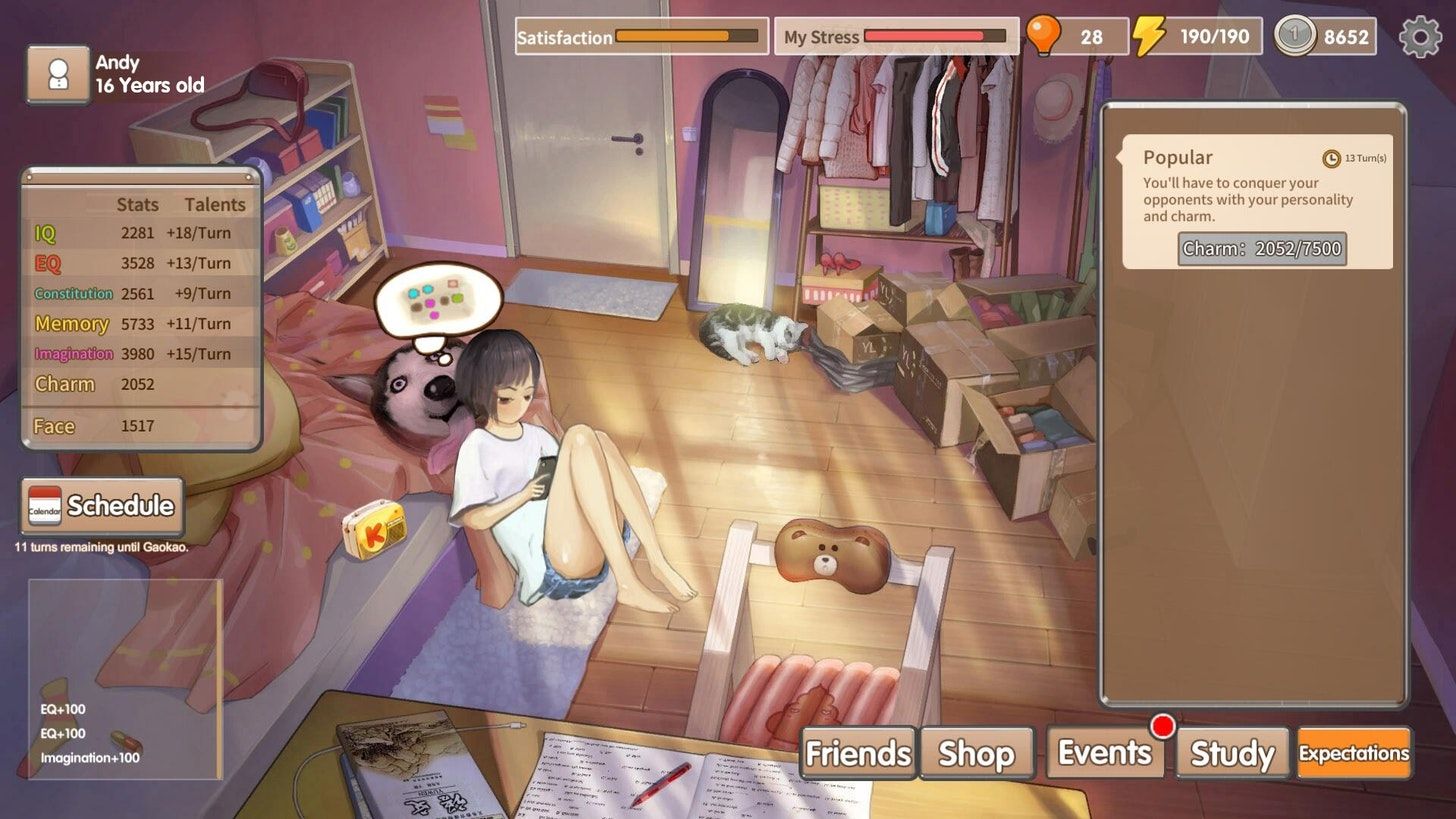
On the other side, there’s also no shortage of surprising niche games and personal projects from Chinese developers on Steam. You can play a visual novel adventure with entirely Cantonese voice acting, or simulators for making tofu or practicing Traditional Chinese Medicine. You can play satires of Chinese work culture or a narrative game about coming out as gay. Some rare games even venture into politics, like the work of developer 内购人生 PABL, whose surprisingly well-received Big Brother is Shaping You, somewhat less didactically named 假如我是人工智能 (“If I were an AI'') in Chinese, is less a game and more a convincing interactive polemic about the dangers of algorithmic curation. There are also impressive, modest successes from solo devs, ranging from the surprisingly polished action platformer Final Swordsman (末代侠客), made as a month-long side project by a combat designer for a larger game company, to the cult hit Bad Kids (坏小孩), an irreverent pixel-art story of growing up as a delinquent in 90s China.
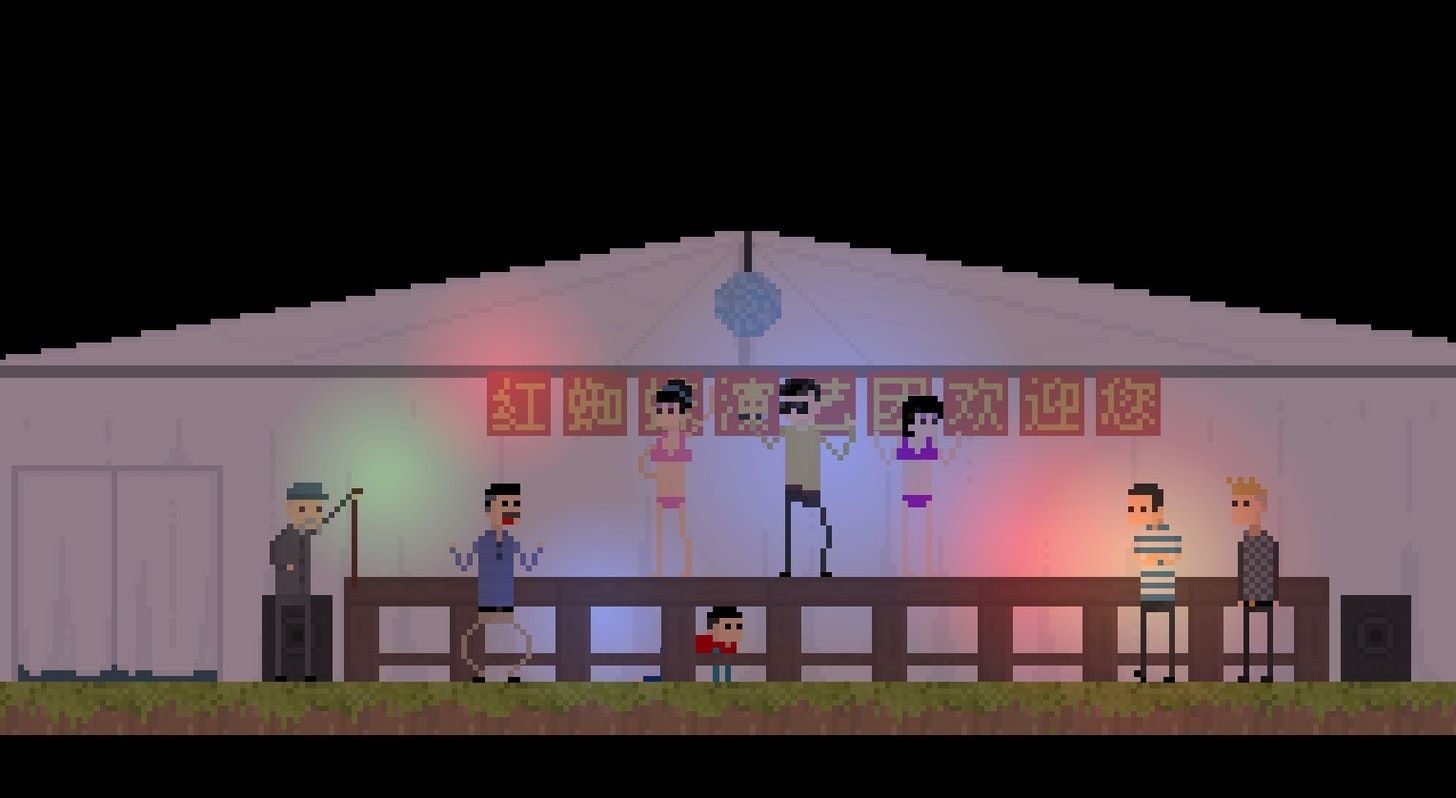
Simon: Going back slightly to Aaron’s earlier comment about how Chinese video games are seen as video games first and Chinese second, that really is the dream for arts and culture from China. As a non-gamer obsessed with other scenes, I can only look on with jealousy. Perhaps stating the obvious, but might some of this happen to do with how games are consumed? It seems this kind of narrative gaming is more often done by yourself, with the social aspect occuring online. Film and literature still seem to require studio and publisher support to cross international boundaries in a meaningful way, and in music the social experience of live performances as well as the added prestige of a physical record/CD/whatever are still quite important. So it is exciting that video games might be uniquely well placed to connect people!

Aaron: Chen Guanpeng’s game Booth is a perfect example of the kind of fascinating and idiosyncratic games that have been able to emerge in this market. Set in a dystopian world grappling with dire food scarcity, the game casts the player as a food inspector stuck in an isolated booth, checking food products being imported along a conveyor belt into their country. Your only escape from the daily grind of work is the relationships you can form with the three different girls who deliver meals to you, but you later discover that even your personal interactions with them are being used as a method of control and surveillance by your government. It’s not a perfect game, but it’s a truly interesting one with a compelling story invested with player choice.
With its focus on food safety, air pollution, and isolation broken only by deliveries, the game feels incredibly Chinese in its themes and strikes an especially resonant if accidental chord with our post-pandemic society. And yet, Booth’s setting isn’t Chinese at all.
Still, Chen said that while the game “was influenced by my experience living in China, where people tend to have this polarization about something, you know, it's either black or white,” the audience he had in mind was “mainly Chinese players and American players, or players that speak English...For pure commercial considerations, we have English speaking players and Chinese players, they make up the most plays on Steam.”
Chinese and American players each make up about 30% of the game’s player base, but according to Chen, reviews on Steam were largely the same regardless of country: “Their contents are basically the same except for the language. There are well-written as well as irrational ones for both languages. The only difference I noticed might be that Chinese players tend to be more generous in giving a recommendation when it's a game made by domestic developers.”
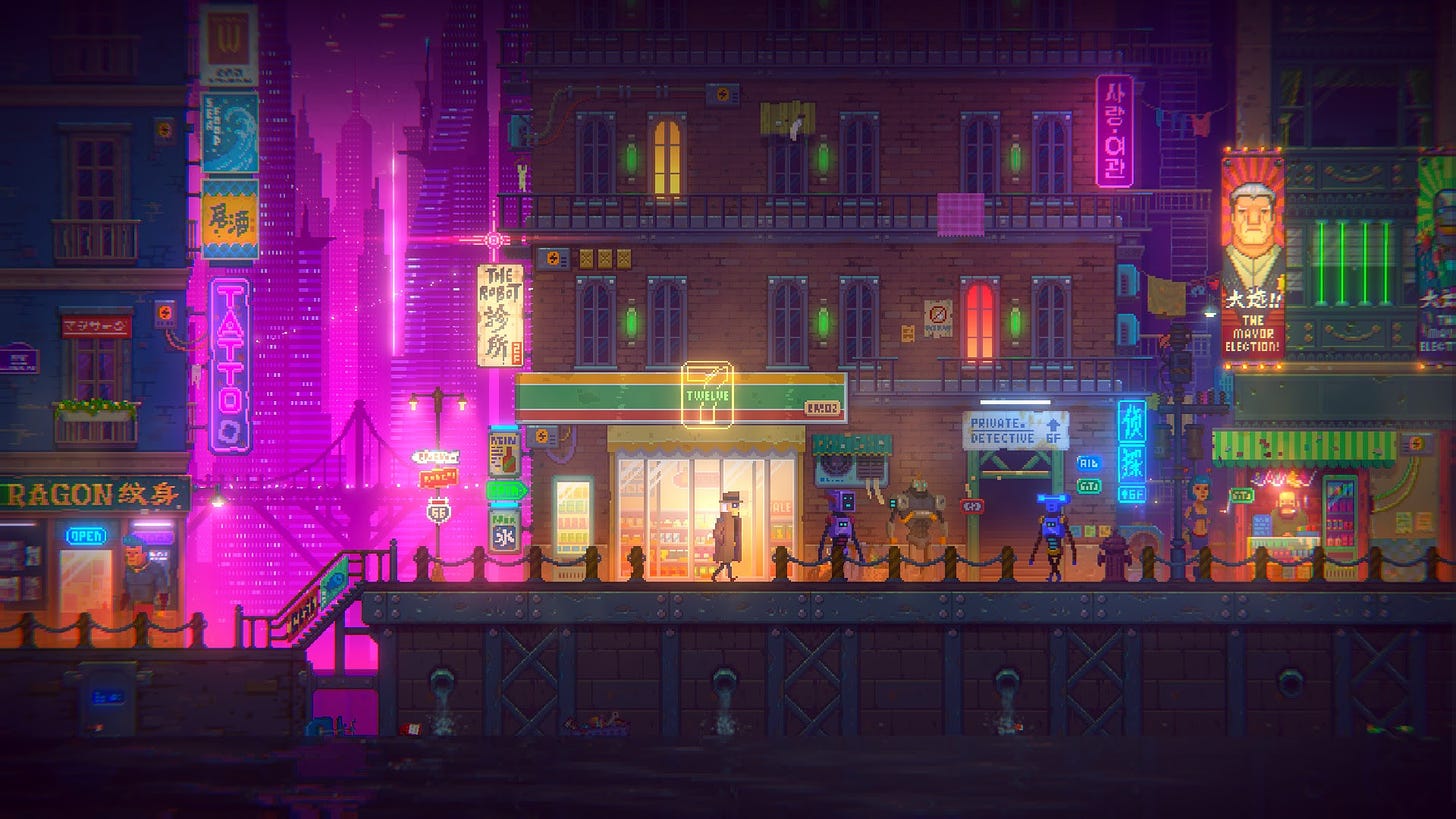
The term “国产” (guochan, “domestically made”) is now often used as a selling point for games, with many Chinese gamers eager to see the development of a domestic games industry finally moving beyond a reputation for cheap clones and mobile games in favor of more prestigious indies and AAA games. It’s not unusual to see positive reviews for Chinese games on Steam specifically mentioning that the reviewer is supporting the game because it’s Chinese made.
That said, Chinese players’ willingness to engage with interesting games extends far beyond domestic productions. For indie developers from other countries, Chinese support can be the crucial thing keeping their games afloat in a tough marketplace. Six years ago, the developer of a successful indie game could list Chinese localization as a hypothetical afterthought. Today, it’s clear to most developers that not localizing their games into simplified Chinese means missing out on a huge portion of the market. Chinese translations for everything from AAA games to tiny indies—none of them officially licensed for release in China—are now common.
While it may fill an important role, though, Steam’s far from perfect as a platform. For starters, it takes a hefty 30% cut of game sales. While there are other digital marketplaces with fairer sales cuts, Steam still dominates the market, especially internationally: Chen says Booth is also available for subscribers to the Humble Monthly subscription and on the indie-friendly marketplace itch.io, but “on itch.io, I only have like 20 copies sold. So far, more than 95% or 99% of copies [sold] are still on Steam.”
Steam’s algorithm tends to favor established hits over newcomers, and the platform’s audience can end up flattening out available games in other ways too. “Steam users are more like the core gamer type,” Zhu Jingtong told me. “I would say the majority of Steam users are more like one of those traditional gamer types, but that’s changing these days because the groups of people who are not really seen as gamers are starting to use Steam as well, due to the popularity of some big titles, for example, PUBG, or some Chinese indie games such as The Invisible Guardian,” an interactive FMV (full-motion video, essentially a movie) game that’s proven a runaway success with Chinese gamers.
While mobile gamers in China are almost evenly split between men and women who don’t necessarily identify as gamers, Steam’s presumed main Chinese audience of middle- or upper-class urban male gamers means a lot of games end up in the same male-focused genres and are often heavy on gratuitous T&A. And that’s before you get to one of Steam’s weirdest categories: hentai games.
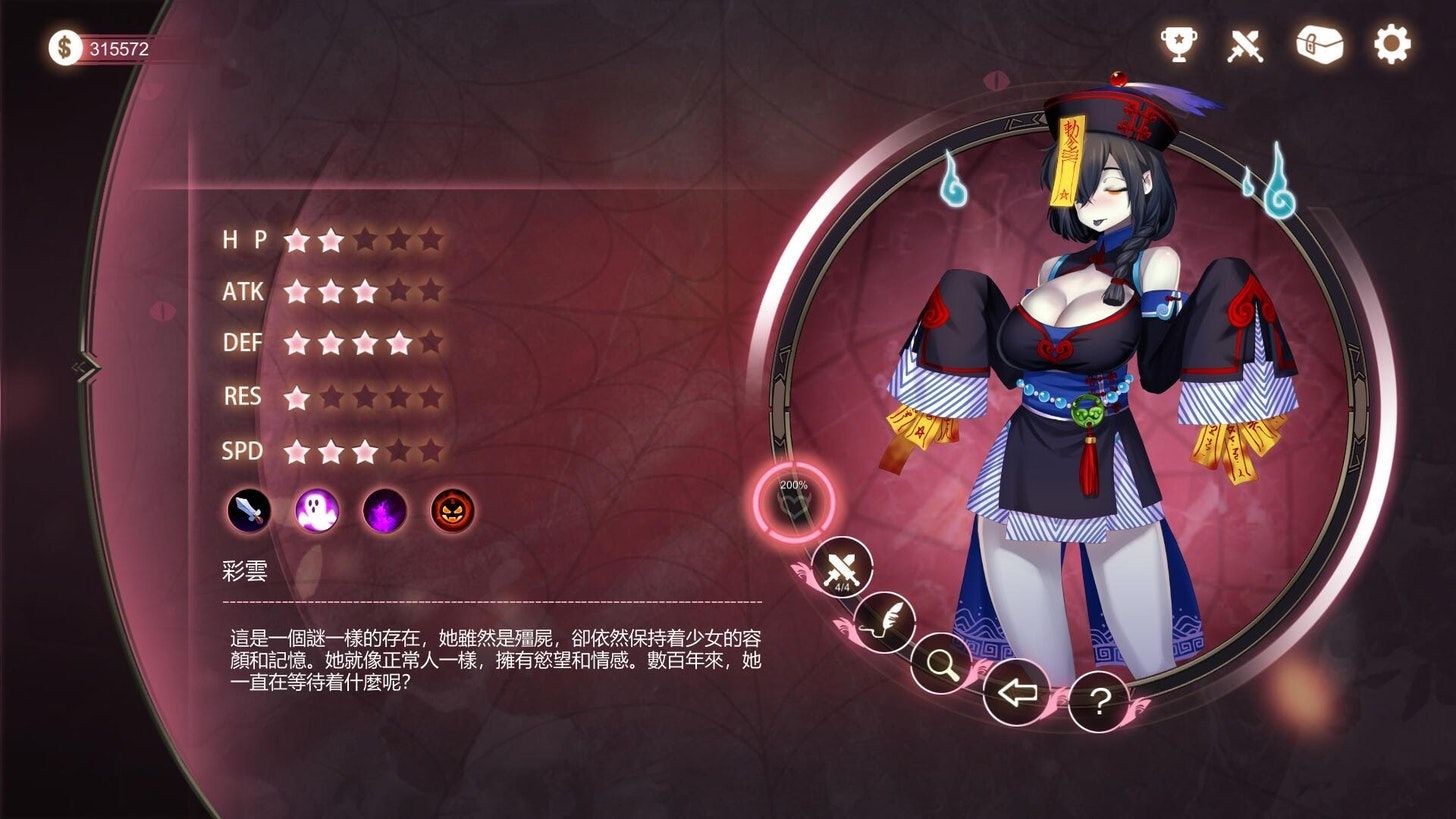
Steam has had a complicated and uneven history with porn on its platform, ultimately settling on the current status quo: porn games can be sold on Steam, but the platform reserves the right to take them down for any reason. While illustrated or computer-generated nudity is allowed, photos or videos are not. The result has been a booming, little-remarked upon market for porn games, much of it driven by Chinese players and Chinese studios.
While straight-up porn games are inaccessible to Chinese users, one of the platform’s China-specific restrictions, a lot of games use a simple workaround: providing risque but not pornographic content, and then making everything from nudity to hardcore sex scenes available with the download of a simple patch. Popular Chinese Steam curators with hundreds of thousands of followers will eagerly recommend cheap porn games like Tower of Waifus 2 alongside games like the gentle, personal non-binary-led narrative indie No Longer Home, just so long as they all have Chinese localization.
Given the illegality of porn in China, “there is definitely a very high risk for developers who make adult games,” Zhu said. In the case of She Will Punish Them, a “sensual dark fantasy ARPG” that the analysis site SteamSpy estimates has between half a million to a million owners, “it sold really well in China, but I think a couple of months ago, the developer decided to pull it from the Chinese market, mostly to avoid any risk because they were getting really popular on social media and they were afraid that the popularity might get them into trouble.”

Krish: This centrality of the Chinese market to the commercial success of many titles hasn’t gone unnoticed. It’s important to reiterate here that Steam’s community/discussion sections are completely walled off if you’re accessing the site from China, which makes Chinese gamers isolated from larger conversations unfolding on Steam (even if most are flaming trash heaps.)
Aaron: Despite porn’s illegality in China, it’s been far from the most controversial aspect of the marketplace when it comes to China. Instead, the biggest symbol of culture clash has been the adoption in China of an old GamerGate-esque tactic: review-bombing campaigns, in which Chinese gamers will leave large numbers of negative reviews on games that have offended them politically or thematically.
First used by Chinese players to pressure foreign game companies into providing Chinese localization, its purpose started to shift as Steam became the site of political controversies for Chinese players. The first of these to gain international attention was with a controversy over the removal of the potentially gendered phrase “好汉 haohan” (hero) in Kerbal Space Program, followed by an incident involving the post-apocalyptic strategy game Frostpunk in 2018, when Chinese players took issue with how the game scolded players for turning to extreme measures like child labor in order to ensure the survival of their city. Frostpunk was an interesting case. The controversy sprang from real differences in how gamers in China and the West view political systems and liberty. And there was a point to Chinese players’ complaints: it doesn’t make much sense for the game to condemn totalitarian rule if it’s also the only method most players have of ensuring the survival of the human race. At the same time, it takes a special level of paranoia or vitriol to try to ruin a game’s success over this.
Yuxin: Sometimes all it takes is a simple hat to cause online fights between South Korean and Chinese players, eventually forcing developers to issue questionable, sus apologies.
Aaron: Frostpunk remained popular in China anyway, but the next major review-bombing incident would turn out much differently. When Taiwanese studio Red Candle Games’ horror game Devotion came out in 2019, it was originally seen (and marketed) within mainland China as a standout guochan game, dominating attention in the Chinese games sphere and receiving overwhelmingly positive reviews from Chinese players on Steam. Then it was revealed that a seal in the game contained text mockingly comparing Xi Jinping to Winnie the Pooh. More tenuous, speculative claims that the game contained easter eggs attacking mainlanders followed.
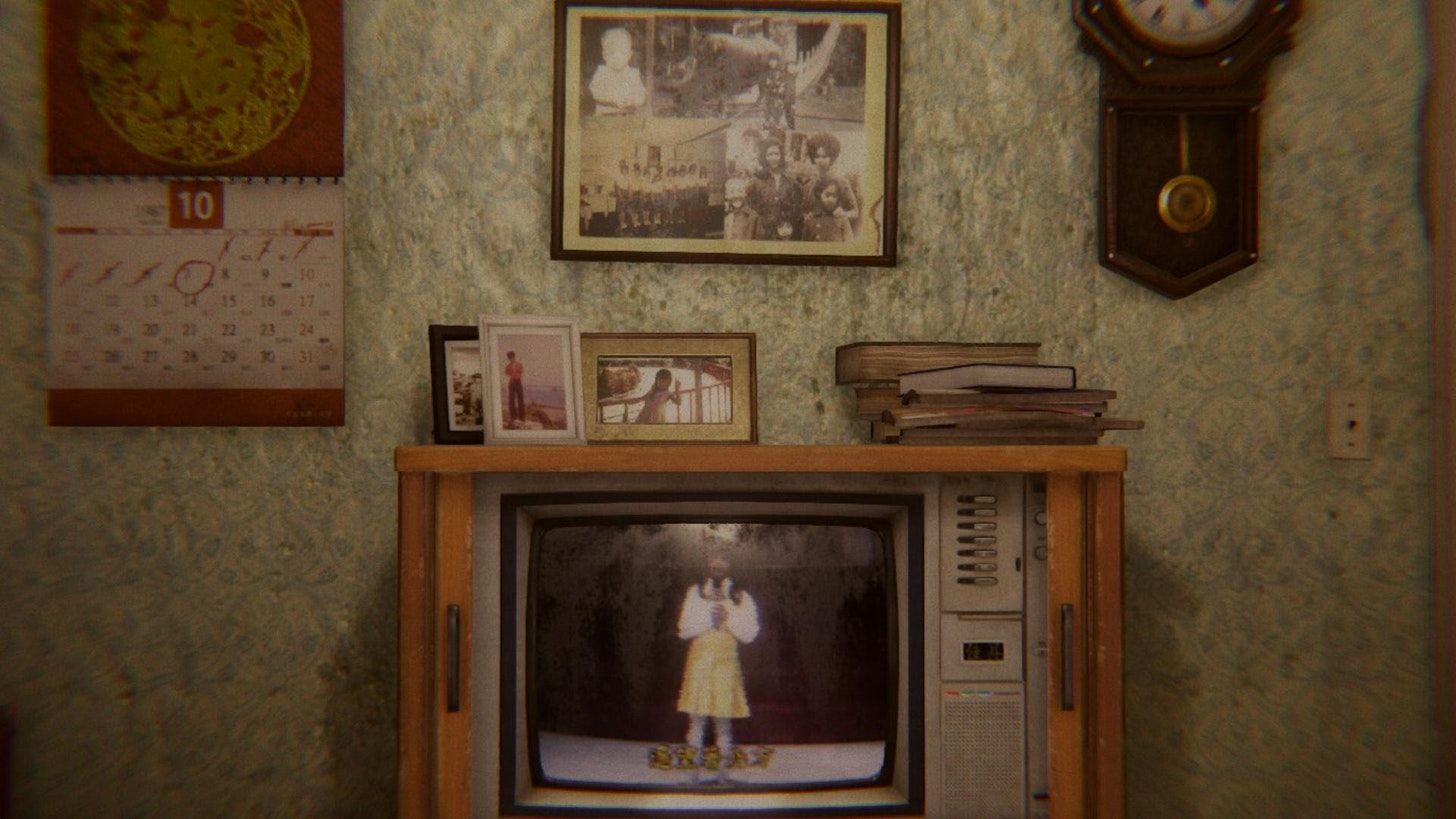
Red Candle Games’ previous game, Detention, was a sharp, thoughtful 2D horror game that grappled directly with the legacy of Taiwan’s period of White Terror under the KMT. The fact that it found such success in mainland China showed the hunger Chinese gamers have for good, emotionally resonant games still based in some kind of Chinese cultural experience, but with its clear engagement with historical atrocities, also represented the kind of game that simply couldn’t have been made by a mainland developer. Once Devotion came under attack, Detention also became the target of review bombing.
The effects of this campaign still reverberate today. Devotion was pulled off Steam, and the game’s Chinese publisher was shut down by the government. Detention remains available, but not for anyone accessing it from China.
Today, looking for traces of Devotion on the Chinese internet leads you to a dead zone: mentions of the game have been scrubbed from social media, making it hard to track exactly how the backlash to the game was built. Instead, even while it’s now available again, Devotion seems to linger on for the rest of the world like a ghost story, used more as an example of China’s repression seeping into the rest of the world than played as a game in its own right.
Henry: Or take Disco Elysium, a not-so-subtle send up of the failures of world socialism, which evaded possible censorship by translating “communism” into the bizarre, phonetic nonce word, kangmizhuyi (it took me about thirty minutes to realize what was being referred to).
Aaron: Review bombing campaigns aren’t unique to China and aren’t representative of most Chinese gamers, but they’ve still provided plenty of fodder for anti-Chinese sentiment from other gamers. That kind of sentiment hasn’t been enough to stop Chinese games from finding international success, but it’s also not uncommon, with player paranoia about popular Chinese games like Genshin Impact or Chinese-funded companies like Epic Games (partially owned by Tencent). Meanwhile, Chinese review bombing campaigns have continued unabated, most recently targeting Fallout 76 (Chinese communist soldiers are featured as an enemy type in the game’s satirical post-apocalyptic Cold War world) and Life is Strange: True Colors (a Tibetan flag is visible in a storefront in the game’s small-town Colorado setting).
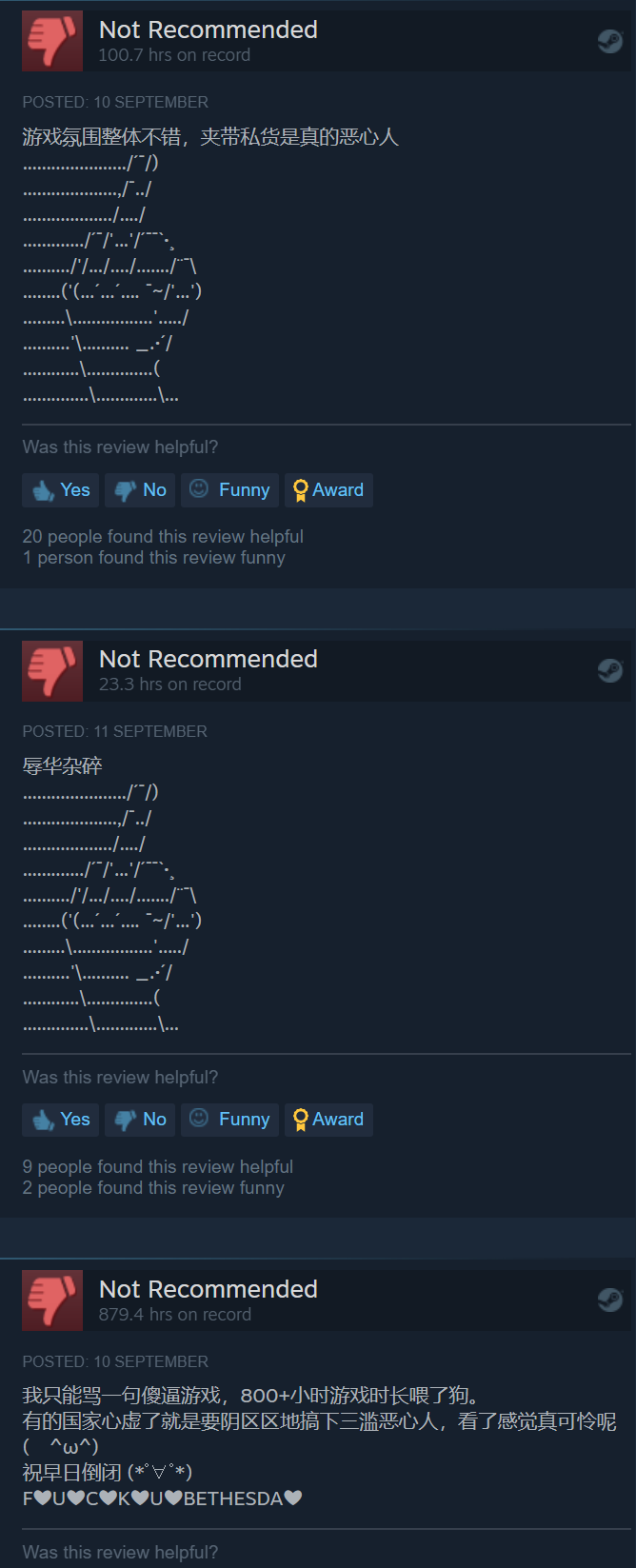
The negative Chinese reviews and broader player reaction to them within Steam have come to operate like a particularly brain-damaged microcosm of the discourse around China: Chinese players come in with ridiculous nationalist outrage, only to receive responses from other players that veer from outright racism to cringeworthy condescension. It’s not uncommon to see Western players on Steam replying to Chinese review bombing with blithe assertions that the Chinese reviewers are all posting to boost their social credit scores, a claim that’s laughable for anyone actually familiar with how life in China works.
This gulf between Chinese and Western players could grow even wider if Steam ever gets blocked in China.
Yuxin: The future is a sword hanging over our head. Apple estimatedly removed nearly 100k unlicensed games from the Chinese App Store in 2020 alone. Only 1414 games were granted a license in 2020, among which about 10% are foreign developed games. Most of these removed games will never be able to return.
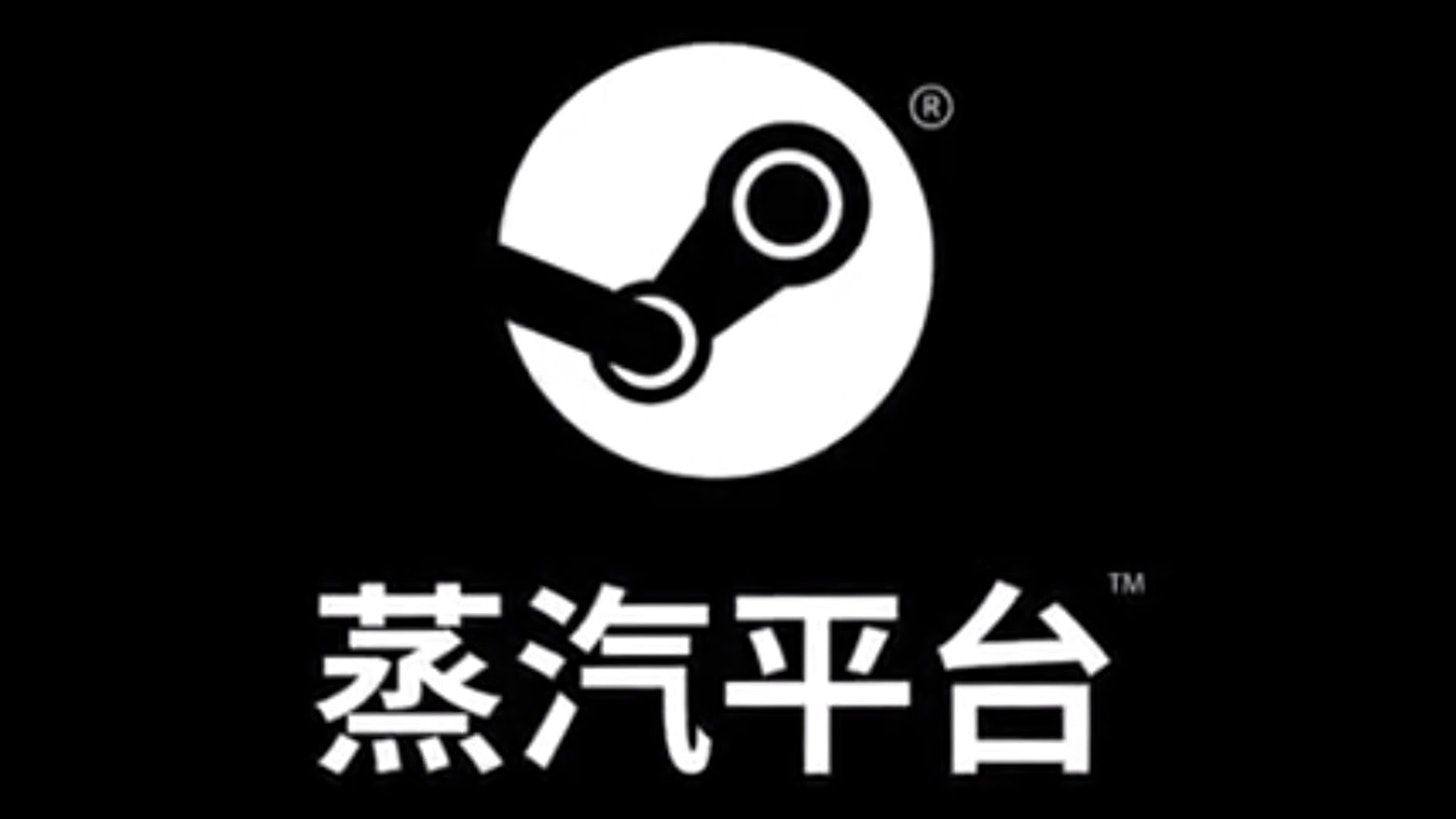
Aaron: In February, Valve partnered with the Chinese game company Perfect World to launch Steam China, an officially sanctioned version of the platform for the Chinese market. Upon launch, the platform boasted only 53 titles. I checked back in on Steam China recently, and it’s now raised that number to a grand total of...61 titles, including unreleased ones. By contrast, Steam global has nearly 50,000.
When Steam China launched, many Chinese players were afraid that this would lead to Steam’s global version getting blocked in China, but so far that hasn’t happened. Interestingly, Zhu told me that the Chinese version of Steam and its domestic partnerships may actually be helping to prevent the global version from being blocked: “Most people just assume that one of the things that might be working is the fact that they kind of set up Steam China as a shell for Steam. Legally there is Steam China, so it makes sense for it to still exist somehow.”
Zhu remains relatively confident that the status quo can continue for at least a little while: “No one knows whether or not it's going to be blocked, because blocks are usually triggered by some kind of event. So unless that event is important enough for the authorities to notice, I don't think the current situation is going to change anytime soon.”
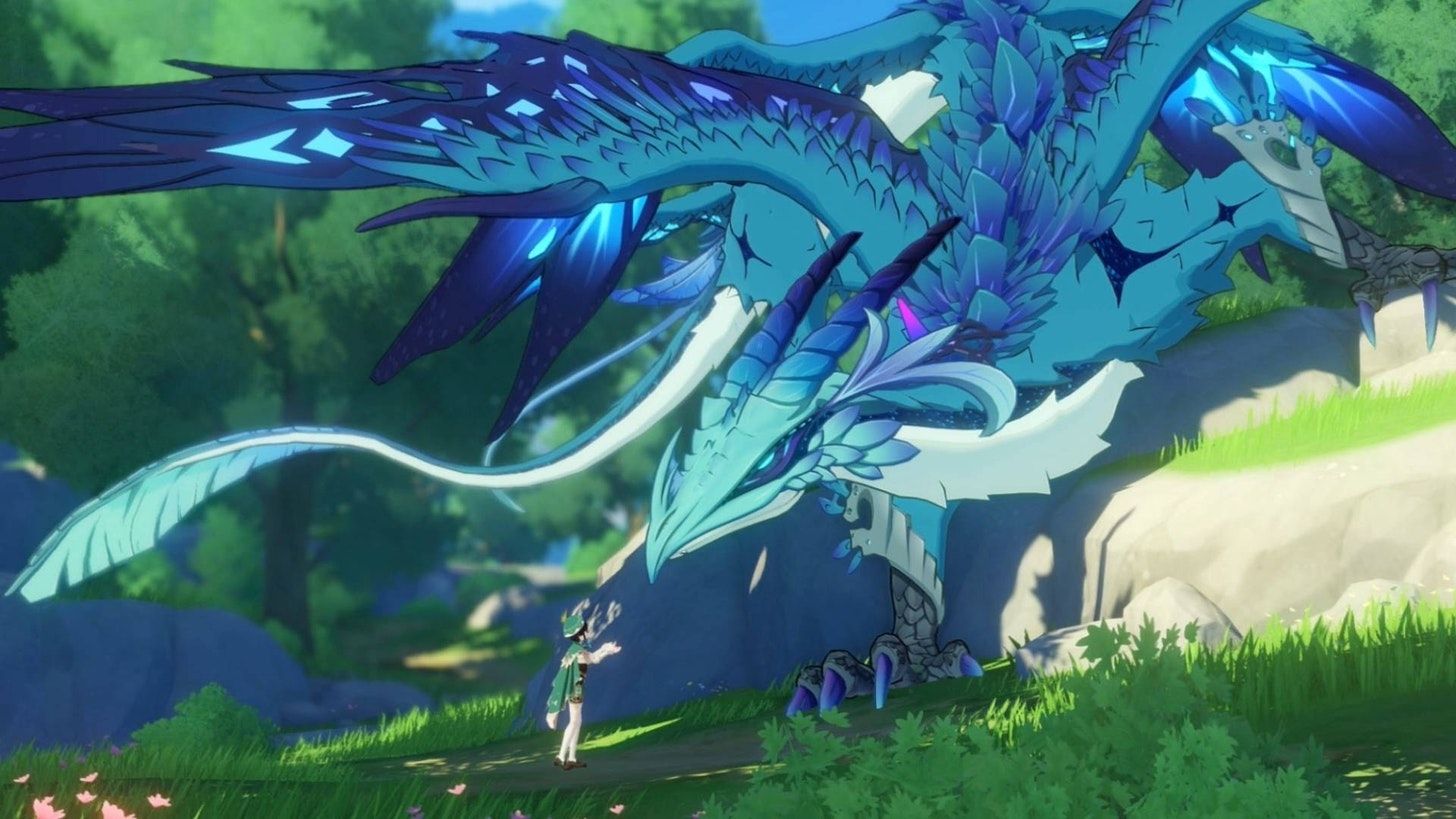
I hope so, but it’s hard not to worry that all it will take is one incident to summon official attention and lead to the closure of Steam’s global version in China. Recent trends have not been encouraging. Last month, the Chinese state-backed games industry association released a pledge signed by hundreds of Chinese game companies vowing not to use international platforms to circumvent Chinese regulations, among other promises. If Steam were cut off, it could have a devastating effect for Chinese indie developers, as well as the many makers of foreign indie games who have come to rely on passionate Chinese player bases to help keep their games afloat.
I asked Chen, now at work with a small team on a new game called Slumhack, what he would do if Steam were to be blocked in China. He told me bluntly that he’d rather forgo a Chinese release than have to go through the process of having his game compromised: “Personally, I won't make any games and at the same time try to get on any platforms with this censorship from the Chinese government...I’d rather give up on that share of the market and just choose normal Steam or other foreign game platforms.”
Krish: If you’d like to play any of the games mentioned in this piece, or check out Chinese indie titles—we’ve converted this essay into a Steam Curator page and recommendation list!
Aaron Fox-Lerner writes games and other things. He has a shamefully large backlog spread across Steam and itch.io.
Jason Li is a freelance graphic artist, editor at Paradise Systems and 88 Bar-tender.
Yuxin Gao is an indie game developer and producer. She created the video game documentary Out for Delivery, and curated Year of the Pig, a sibling exhibition to this episode.
Christina Xu was once emcee at the Game Developers Conference in China. She will not be taking any further questions.
Krish Raghav is a comic book artist in Beijing. He misses Home of the Underdogs, the OG proto-Steam.
Simon Frank is a writer, editor, and musician in Beijing. He misses all Chaoyang exiles.
Henry Zhang is a writer who lives in New Haven and dreams of Chaoyang.
Tianyu Fang is a writer from the Chaoyang diaspora in the San Francisco Bay Area.
